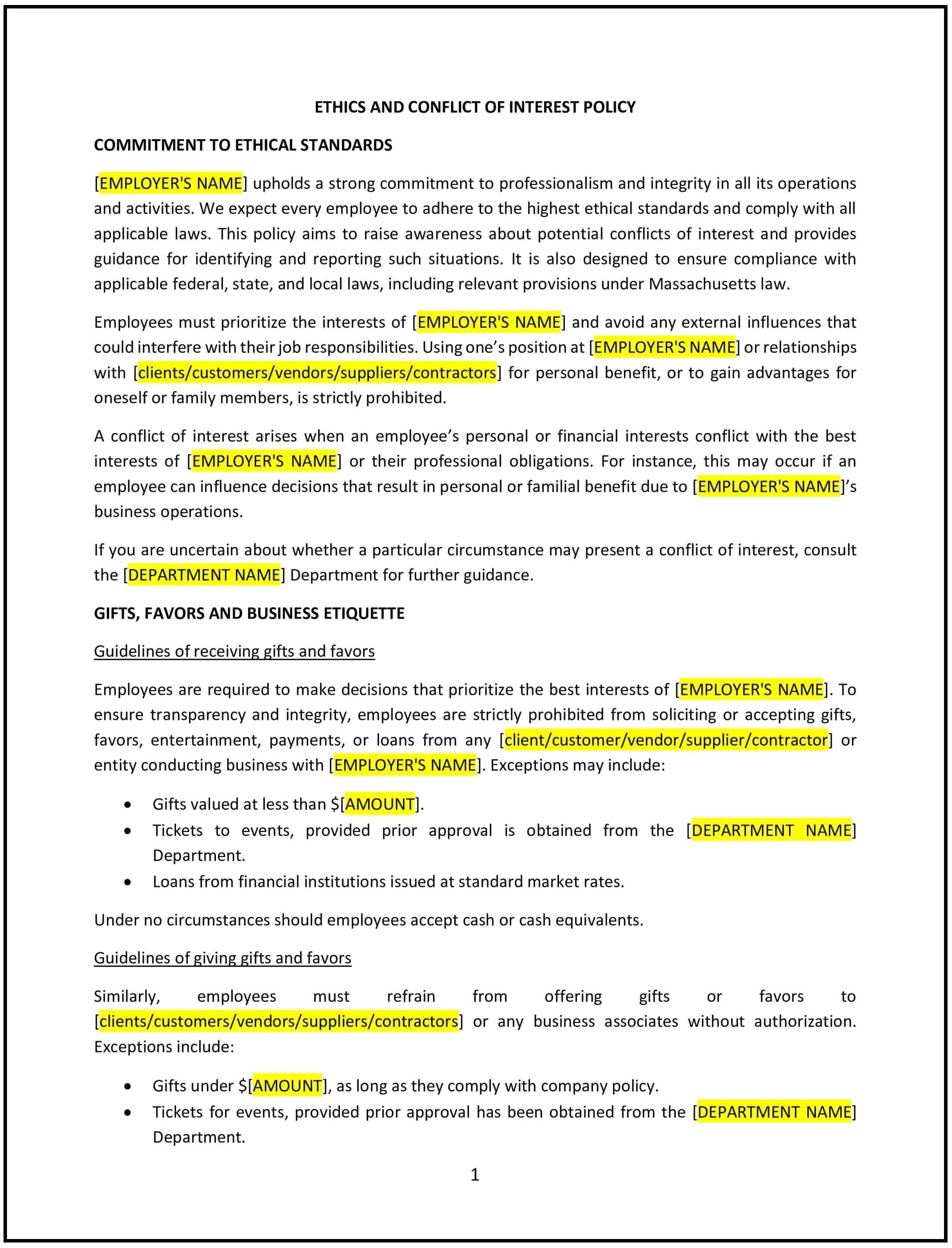Ethics and conflict of interest policy (Massachusetts): Free template
Got contracts to review? While you're here for policies, let Cobrief make contract review effortless—start your free review now.

Customize this template for free
This ethics and conflict of interest policy is designed to help Massachusetts businesses establish guidelines for maintaining ethical conduct and avoiding conflicts of interest in the workplace. The policy outlines the company's commitment to upholding the highest standards of integrity, transparency, and fairness, and specifies how employees should handle situations where their personal interests could conflict with the company's interests. The policy provides guidance on identifying, disclosing, and resolving conflicts of interest to ensure that business decisions are made impartially and in the best interest of the company.
By adopting this policy, businesses can maintain a culture of ethical behavior, protect their reputation, and ensure that employees act with honesty and integrity in all business dealings.
How to use this ethics and conflict of interest policy (Massachusetts)
- Define conflict of interest: Clearly define what constitutes a conflict of interest, including situations where an employee’s personal, financial, or familial interests could influence or appear to influence their professional judgment. Examples may include personal relationships with vendors, financial investments in competing businesses, or outside business activities.
- Outline reporting requirements: Establish a clear process for employees to report potential conflicts of interest. Employees should be required to disclose any situations that could create a conflict, either before the situation arises or as soon as it becomes apparent. The policy should specify who to report conflicts to (e.g., HR, direct supervisor, or ethics committee).
- Address outside employment and activities: Specify the company’s stance on outside employment, side businesses, or personal projects that could create a conflict with an employee’s duties to the company. The policy should clarify whether employees are permitted to have outside work or interests, and under what circumstances those interests must be disclosed.
- Identify prohibited conduct: List specific behaviors or actions that are prohibited due to potential conflicts of interest. This may include accepting gifts or kickbacks from suppliers, engaging in personal business dealings with clients, or using company resources for personal gain.
- Define consequences for violations: Clearly outline the consequences of failing to disclose conflicts of interest or engaging in unethical behavior. Disciplinary actions may include corrective action, reassignment, suspension, or termination, depending on the severity of the violation.
- Encourage transparency and accountability: Promote a culture of openness and accountability by encouraging employees to disclose any potential conflicts of interest without fear of retaliation. The policy should reassure employees that reports will be taken seriously and handled confidentially.
- Ensure compliance with Massachusetts and federal laws: Ensure that the policy complies with Massachusetts state laws, federal regulations, and industry standards regarding ethical conduct and conflict of interest, including laws related to bribery, corruption, and fraud.
Benefits of using this ethics and conflict of interest policy (Massachusetts)
This policy offers several benefits for Massachusetts businesses:
- Promotes ethical conduct: By setting clear expectations for ethical behavior, businesses create a workplace where employees act with honesty, integrity, and accountability.
- Protects the company’s reputation: A strong ethics and conflict of interest policy helps businesses avoid situations that could damage their reputation, such as scandals or legal violations related to unethical behavior.
- Reduces legal risks: By complying with Massachusetts state laws and federal regulations, the policy helps businesses mitigate the risk of legal claims or penalties resulting from conflicts of interest or unethical behavior.
- Increases employee trust: Employees who see that the company is committed to maintaining ethical standards are more likely to trust management and feel secure in their work environment.
- Enhances decision-making: By eliminating conflicts of interest, businesses can ensure that decisions are made impartially and in the best interest of the company, rather than being influenced by personal gain.
- Improves company culture: A focus on ethics and transparency fosters a positive and respectful workplace culture, where employees feel valued and are motivated to contribute to the company’s success.
Tips for using this ethics and conflict of interest policy (Massachusetts)
- Communicate the policy clearly: Ensure that all employees are aware of the ethics and conflict of interest policy and understand their responsibilities regarding disclosure and ethical conduct. This can be done through employee handbooks, orientation programs, and training sessions.
- Provide regular training: Offer regular training on the company’s ethics policy and conflict of interest guidelines to reinforce the importance of ethical behavior and help employees identify potential conflicts.
- Monitor compliance: Regularly monitor the implementation of the policy to ensure employees are following the guidelines and reporting conflicts of interest as required. Conduct audits and reviews to identify any potential issues or violations.
- Encourage an open-door policy: Promote open communication by encouraging employees to approach management or HR if they are unsure about a potential conflict of interest. Employees should feel comfortable seeking guidance on how to handle tricky situations.
- Review and update regularly: Periodically review and update the policy to ensure it remains compliant with Massachusetts state laws, federal regulations, and industry best practices, and to address any changes in the business or its operations.